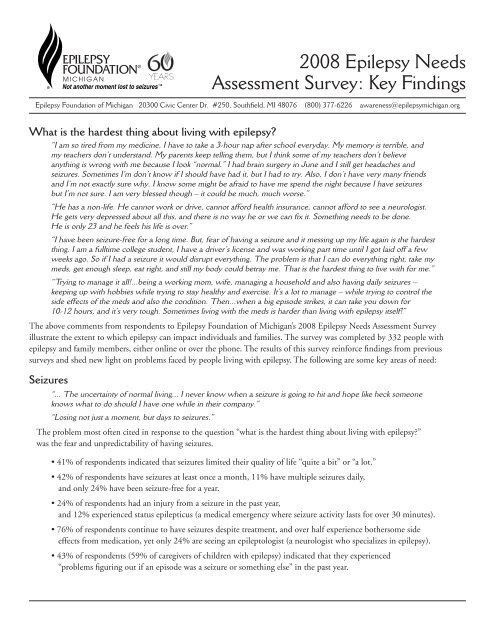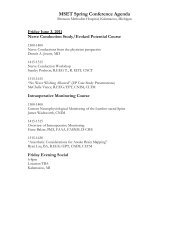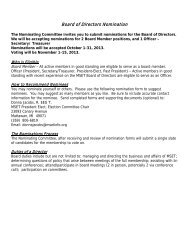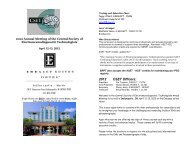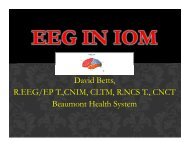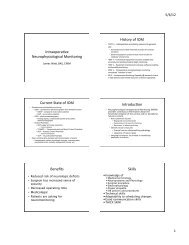2008 Epilepsy Needs Assessment Survey: Key Findings
2008 Epilepsy Needs Assessment Survey: Key Findings
2008 Epilepsy Needs Assessment Survey: Key Findings
- No tags were found...
You also want an ePaper? Increase the reach of your titles
YUMPU automatically turns print PDFs into web optimized ePapers that Google loves.
<strong>2008</strong> <strong>Epilepsy</strong> <strong>Needs</strong><strong>Assessment</strong> <strong>Survey</strong>: <strong>Key</strong> <strong>Findings</strong><strong>Epilepsy</strong> Foundation of Michigan 20300 Civic Center Dr. #250, Southfield, MI 48076 (800) 377-6226 awareness@epilepsymichigan.orgWhat is the hardest thing about living with epilepsy?“I am so tired from my medicine, I have to take a 3-hour nap after school everyday. My memory is terrible, andmy teachers don’t understand. My parents keep telling them, but I think some of my teachers don’t believeanything is wrong with me because I look “normal.” I had brain surgery in June and I still get headaches andseizures. Sometimes I’m don’t know if I should have had it, but I had to try. Also, I don’t have very many friendsand I’m not exactly sure why. I know some might be afraid to have me spend the night because I have seizuresbut I’m not sure. I am very blessed though – it could be much, much worse.”“He has a non-life. He cannot work or drive, cannot afford health insurance, cannot afford to see a neurologist.He gets very depressed about all this, and there is no way he or we can fix it. Something needs to be done.He is only 23 and he feels his life is over.”“I have been seizure-free for a long time. But, fear of having a seizure and it messing up my life again is the hardestthing. I am a fulltime college student, I have a driver’s license and was working part time until I got laid off a fewweeks ago. So if I had a seizure it would disrupt everything. The problem is that I can do everything right, take mymeds, get enough sleep, eat right, and still my body could betray me. That is the hardest thing to live with for me.”“Trying to manage it all!...being a working mom, wife, managing a household and also having daily seizures –keeping up with hobbies while trying to stay healthy and exercise. It’s a lot to manage – while trying to control theside effects of the meds and also the condition. Then...when a big episode strikes, it can take you down for10-12 hours, and it’s very tough. Sometimes living with the meds is harder than living with epilepsy itself!”The above comments from respondents to <strong>Epilepsy</strong> Foundation of Michigan’s <strong>2008</strong> <strong>Epilepsy</strong> <strong>Needs</strong> <strong>Assessment</strong> <strong>Survey</strong>illustrate the extent to which epilepsy can impact individuals and families. The survey was completed by 332 people withepilepsy and family members, either online or over the phone. The results of this survey reinforce findings from previoussurveys and shed new light on problems faced by people living with epilepsy. The following are some key areas of need:Seizures“... The uncertainty of normal living... I never know when a seizure is going to hit and hope like heck someoneknows what to do should I have one while in their company.”“Losing not just a moment, but days to seizures.”The problem most often cited in response to the question “what is the hardest thing about living with epilepsy?”was the fear and unpredictability of having seizures.• 41% of respondents indicated that seizures limited their quality of life “quite a bit” or “a lot.”• 42% of respondents have seizures at least once a month, 11% have multiple seizures daily,and only 24% have been seizure-free for a year.• 24% of respondents had an injury from a seizure in the past year,and 12% experienced status epilepticus (a medical emergency where seizure activity lasts for over 30 minutes).• 76% of respondents continue to have seizures despite treatment, and over half experience bothersome sideeffects from medication, yet only 24% are seeing an epileptologist (a neurologist who specializes in epilepsy).• 43% of respondents (59% of caregivers of children with epilepsy) indicated that they experienced“problems figuring out if an episode was a seizure or something else” in the past year.
Psychosocial Challenges“I am always afraid of being in a social situation because I never know if I am going to have some type of seizure.I often feel alone and depressed.”“I also deal with a family member who, through devotion and care, is overbearing, and that makes me feel lesscapable than I actually am.”• 26% of respondents (34% of adult respondents) experienced clinical depression in the past year,and 26% had an anxiety disorder.• 48% of respondents (55% of adult respondents) experienced loneliness in the past year,and 48% (54% of adult respondents) had low self esteem.• The following problems were each experienced by over one third of respondents in the past year:discomfort in social situations (44%), overprotection from family members (43%), family conflict (35%),being left out or mistreated by others because of epilepsy (34%), and chronic irritability (33%).• “Psychosocial Challenges” was the largest category of responses to the question “what is the hardest thingabout living with epilepsy?” The most common theme in this category was “social isolation,” followed by“psychological/emotional symptoms,” “restrictions and limitations,” and “dependence on others.”Problems with Memory and Thinking“not being able to think clearly, unable to easily learn new things, short term memory is very bad, difficultyspeaking spontaneously”“I am having a difficult time learning at school because of the memory and focus issues I have.”• 90% of respondents indicated that their quality of life was limited by problems with memoryand thinking (47% said it was limited “quite a bit” or “a lot”).• Of 38 problems listed in the survey (five of which relate cognitive function);four of the top six most commonly experienced problems related to cognitive function(memory problems, trouble thinking clearly or at normal speed, attention problems, and learning problems).• 75% of respondents indicated that they don’t have enough informationon how to improve memory and thinking.• Learning problems were experienced by 80% of children with epilepsy in the past year.Employment Difficulties“She has to depend on others to take her to work – the bus ride alone is 2 hours one way. She’s trying to take careof herself financially, but is unable to work full time. She’s trying to work 2 part time jobs, but at her new place shehad a seizure and they have cut her hours.”“The hardest thing about living with epilepsy is the underemployment aspect. There is a belief that if you haveseizures that you cannot do the “full” job. When I interview, I am up front with my condition to preventmisunderstandings, but I find that such candor works against me rather than for me.”• Only 27% of adult respondents were employed full-time.• 38% of adults respondents were unemployed (as compared to a 9.6% unemployment ratein Michigan as of 11/08).
<strong>2008</strong> <strong>Epilepsy</strong> <strong>Needs</strong> <strong>Assessment</strong> <strong>Survey</strong>: <strong>Key</strong> <strong>Findings</strong>• The Mean Annual Personal Income of full-time year round workers with epilepsy in this survey was $39,690as compared to the U.S. average of $52,703 (American Community <strong>Survey</strong>, 2007)• 51% of respondents indicated that employment problems limited their quality of life “quite a bit” or “a lot.”• 61% of respondents indicated that they don’t have enough information on how to find and keep employment.• 10% of respondents used vocational rehabilitation services in the past year; half of these individualsgot a job as a result.Lack of Transportation“[The hardest thing is] not being able to go where I want when I want. The transportation system around here isnot wonderful.”“I was a special ed. bus driver, and now I can no longer do that job.”“I have a 15 year old daughter and I miss out on so many things because her dad takes her, and she lives with himbecause he drives.”• In the open-ended section, key consequences of not being able to drive included difficulty getting to work,social isolation, and dependence on others.• 17% of respondents mentioned inability to drive or lack of transportation when asked“what is the hardest thing about living with epilepsy?”Public Misunderstanding“I was surprised at how many people didn’t understand how widespread epilepsy is and how many varioustypes exist.”“Kids at school think I am weird and don’t understand. I think they are afraid they will catch something,like a cold.”“People think you are faking your seizures, and they think you can control them…especially the ER doctors.”“She had a seizure. While unconscious, he put a candy bar down her throat. He thought that he was helping.”• 11% of adult respondents with epilepsy received incorrect seizure first aid from someone in the past year.• 40% of children with epilepsy experienced “being left out or mistreated by others because of epilepsy” in thepast year.Physical Health Problems“sleeping problems” “weight gain” “pain in the head all the time” “fatigue” “always feeling shaky”• 61% of respondents experienced sleep problems in the past year(the third most common problem of 38 problems listed).• 39% of respondents experienced frequent headaches, 37% experienced chronic drowsiness,and 17% experienced chronic pain in the past year.• 59% of respondents have at least one chronic health problem in addition to epilepsy.


